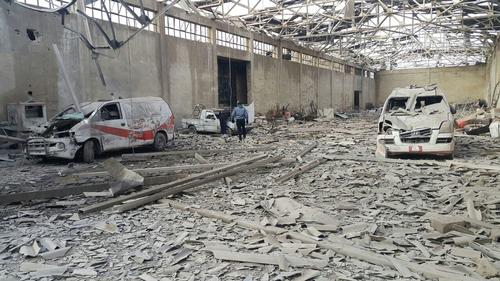Medics in Syria that MSF supports tell us of what they're seeing during the conflict.
“Our medical point was bombed. We relocated to another place. That place also got bombed. That second time, the rescuers and others around the area rushed in to excavate people from under the rubble and that’s when a second bombing happened on that same spot, just when the people were all gathered there. We had around 100 people wounded and no working facility.”
- Male medical assistant, working in a health clinic
“If you count you the hundreds of bodies, the ones alive, and the ones dead; the body parts; there is nothing we can do for them. Even if we had enough supplies, there’s nothing we can do to answer to such a huge number of people. It’s not so much medical supplies that we need from you, but your help in stopping the bombing.”
We cannot transfer any patients out of our hospital. Any person or car walking the streets will surely die. We are even unable to refer patients that need intensive care to the Intensive Care Unit that is 5km away. We are obliged to keep them here, and here we do not have respiratory masks. We are resorting to the use of manual ventilators, and so each patient permanently needs somebody to operate that ventilator. With so many patients coming it’s impossible - we are losing so many patients because of the shortages we have. Patients would have a chance if we could refer them five kilometres to the ICU, but with the intensity of the bombing we can’t.”
- Female doctor, manager of a major field hospital
“Our hospital is full, and we already got hit twice. When the patients started overflowing, we reassigned another location normally used as an outpatient clinic close to us. We are now using it just to have enough space to give whatever care we can to the patients. We are 250 people (between staff and patients) and we have nothing to eat.”
- Male doctor, working in a field hospital
“It’s getting very difficult to refer patients. Anytime an ambulance leaves the facility, it gets bombed. The only way we have to refer patients is via tunnels.”
- Male doctor, working in a field hospital




